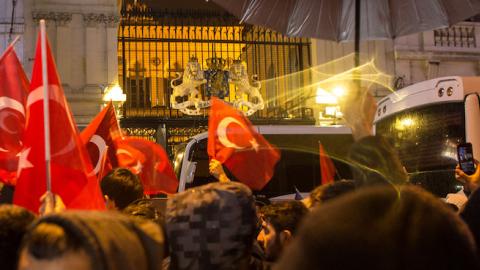A bitter dispute between Turkey and the European Union is spreading across the continent this week, following decisions by the German and Dutch governments to cancel Turkish diaspora rallies in Europe. Financial Times reports:
Recep Tayyip Erdogan, Turkey’s president, on Sunday accused the Dutch government of behaving like Nazis, capping a weekend of high drama that began when the Netherlands refused to let his foreign minister’s plane land for a rally in the Turkish referendum campaign.
The dispute between the two Nato members reverberated across Europe after Denmark waded into the debate by cancelling a meeting between Lars Lokke Rasmussen, its prime minister, and Binali Yildirim, his Turkish counterpart. “With the current Turkish attacks on Holland the meeting cannot be seen separated from that,” Mr Rasmussen said. […]
“Nazism is alive in the west,” Mr Erdogan said, repeating an insult he had directed at Germany last week after authorities there cancelled two of Mr Cavusoglu’s speeches, forcing him in Hamburg to address supporters from a consulate balcony.
Erdogan's inflammatory accusations are not merely anti-EU posturing. Turkey and the West are undergoing an increasingly acrimonious divorce, with both sides shedding former illusions about their shared values and interests. Erdogan has locked up tens of thousands of people on the flimsiest excuses, committed extraordinary human rights abuses, and abandoned every principle that the EU believes in. More fundamentally, he has destroyed the best hope in a generation of genuinely Islamic form of democracy, and is currently stoking Islamophobia in the West and xenophobia in Turkey.
The escalating row is already increasing this mutual resentment. In Turkey, the diplomatic slights and police action against protesters have incited popular outrage, with both AK Party supporters and the opposition calling for a suspension of relations with the Netherlands, while Erdogan mulls sanctions. In the Netherlands, Geert Wilders has harped on the controversy to drum up last-minute momentum for his anti-Islamic party ahead of Wednesday's elections; France's Marine Le Pen has similarly been demagoguing the issue. Mainstream European politicians, meanwhile, are feeling the pressure to take a hard line against Turkey to avoid being outflanked by the far Right.
These kinds of reactions could very well help Erdogan's case at home, as he builds support for the controversial referendum on April 16 to consolidate his powers in an executive presidency. Millions of Turkish diaspora members in Europe will also be voting on the matter, and could prove decisive in tilting the referendum his way. If enacted, the measures would only further exacerbate Turkey's democratic drift, and could allow Erdogan to stay in power until 2029.
Win or lose in the coming referendum—and it seems unlikely that a man as determined as Erdogan and as careless of legal niceties will do anything but win—the prospects of the EU and Turkey patching things up look increasingly dim. Turkey's government will continue to act as a destabilizing force in the Balkans and elsewhere, complicating the task of a European foreign policy system that was already greatly overtaxed.



















